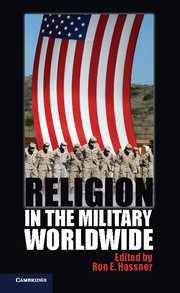6 - Iran
Published online by Cambridge University Press: 05 June 2014
Summary
The 1979 Islamic Revolution drastically changed the structure of Iran’s military forces. The Iranian Imperial Army (IIA), one of the most powerful armies in the region, underwent a comprehensive restructuring process to become the Islamic Republic of Iran Army (IRIA). New institutions were established to provide religious and ideological education to members of the army. Supreme Leader Ayatollah Ruhollah Khomeini ordered the establishment of two new forces based on the Islamic Revolutionary ideology: the Islamic Revolution Guards Corps (IRGC) and the Basij. Their main responsibility was to defend the revolution and protect its religious values and ideals. Thus, from the very beginning, Iran’s religious leadership sought to expand its influence in the military, and religion came to play an even more dominant role in the military establishment after the Iraqi invasion in 1980. Iran’s religious leaders perceived the Iran-Iraq War as a threat to the Islamic Revolution and its ultimate religious ideal, the “Return to the True Islam.” Khomeini named the war a “War of Islam against Blasphemy” and closely tied its symbolic significance to religion.
In this chapter, I argue that the Iranian military intertwined nationalism, revolutionary ideals, and religious and cultural norms after the 1979 revolution. I focus on the role of religion and how religious passion drove masses of young revolutionaries into battle to defend the Islamic Revolution. These volunteers inspired a new strategy of self-sacrifice, or “martyrdom seeking.” As the demographics of war casualties testify, these martyrdom operations came to play a major role in the Iran-Iraq War. Religiously motivated volunteers also expanded and strengthened the IRGC until it became the primary organization responsible for waging the war. By relying on strategies shaped by religion and ideology, the IRGC was able to marginalize the IRIA, which insisted on pursuing classical war strategies.
- Type
- Chapter
- Information
- Religion in the Military Worldwide , pp. 143 - 158Publisher: Cambridge University PressPrint publication year: 2013
References
- 2
- Cited by



